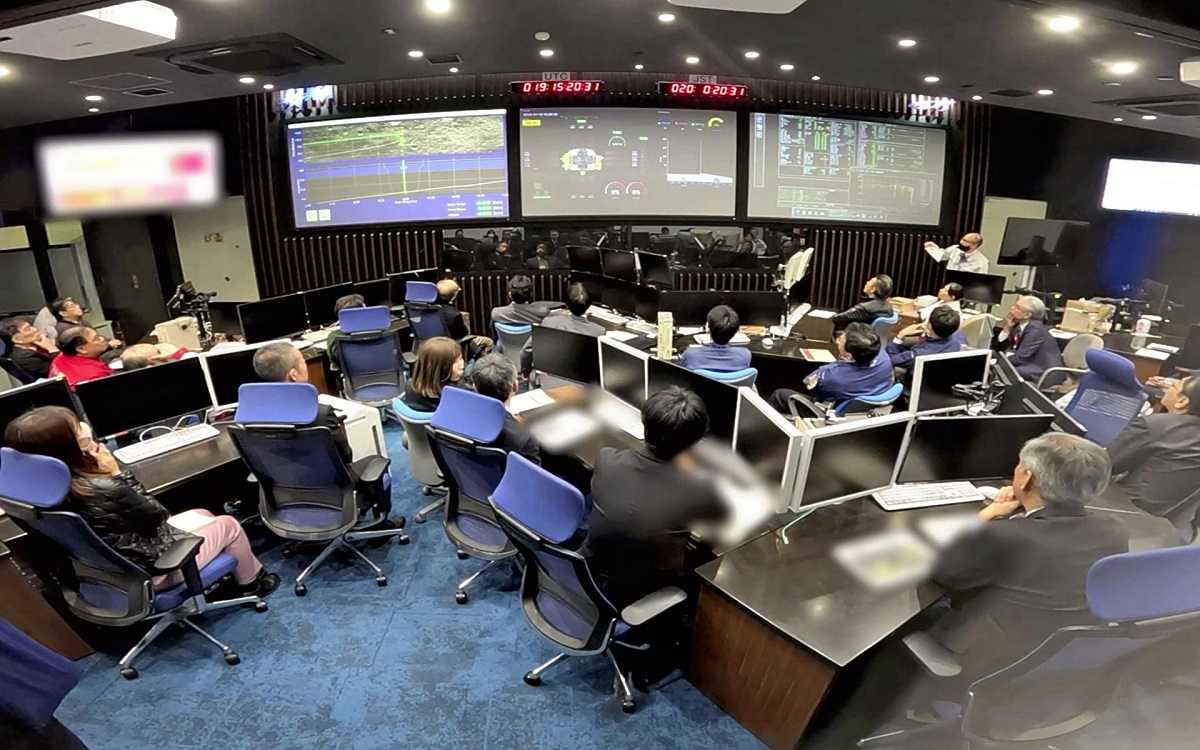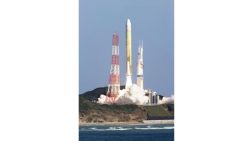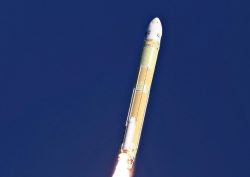SLIM Lander Paves Way for Japan in Lunar Exploration; Vital to Reduce Risk of Conflicts Over Resource Development

Japan Aerospace Exploration Agency officials and others observe the operation of the Smart Lander for Investigating Moon after it landed.
17:15 JST, January 21, 2024
A JAXA lunar probe has landed, giving Japan a foothold in the global space race.
Space-related business activity involving the moon is expected to heat up, so it is important to reduce the risk of conflicts over resource development.
“Fierce competition is going on all over the world. Our probe made it to landing, and that has paved the way to the moon,” Japan Aerospace Exploration Agency (JAXA) President Hiroshi Yamakawa said early Saturday morning at a press conference at the Institute of Space and Astronautical Science in Sagamihara.
Yamakawa was referring to the landing of the Smart Lander for Investigating Moon, or SLIM. The mission’s main objective is to test so-called pinpoint landing technology, which is aimed at descending close to a target location on the lunar surface.
Lunar probes recently launched by the United States, Russia and India have landed from within a few kilometers to several tens of kilometers from their targeted locations. The objective with SLIM is to land within just 100 meters of the target.
“It’s just like passing over New Chitose Airport in Hokkaido at several times the speed of an airplane, then immediately decelerating and landing on Koshien Stadium [in Hyogo Prefecture],” said Shinichiro Sakai, manager of the SLIM Project Team.
If this technology can be made to work reliably, it will allow “landing where [a spacecraft] wants to land” instead of the conventional “landing where it can land.”
Lunar resources
Shinichi Nakasuka, a professor at the University of Tokyo who specializes in space technology, stressed the significance of acquiring world-class precision landing technology. “It will enhance Japan’s international presence in lunar exploration,” Nakasuka said.
To date, space development through multilateral cooperation has been led by the International Space Station (ISS), participants in which have included Japan, the United States, European countries and Russia. However, ISS operations are expected to end in 2030, and China in 2022 began full-scale operations of its own space station.
The focus of space development is shifting from near-Earth orbit to the more distant moon. Since 2019, the United States has been proceeding with the Artemis Plan, a manned lunar exploration mission in which Japan participates, with a plan to establish a base on the moon.
China has also announced its plan to build a lunar base, and Russia has expressed its willingness to cooperate.
Each country is targeting water resources believed to exist in the lunar polar regions. Water is essential for human activities and can also be used as fuel for spacecraft by producing hydrogen and oxygen through electrolysis.
Last August, the Indian probe Chandrayaan-3 became the first in the world to land near the moon’s south pole to investigate water resources. Indian Prime Minister Narendra Modi watched the live broadcast of the landing, and the entire country has been working together to advance the project.
Japan’s landing technology will be advantageous in searching for lunar resources such as water and minerals ahead of other countries. Japan has so far developed landing technologies adapted to different environments, seen as that used by the asteroid probe Hayabusa2.
This know-how can be expected to be applied to the exploration and development of even more distant celestial bodies, such as Mars.
Risk of conflict
However, with more countries moving forward with lunar exploration, the risk of conflict is likely to increase. The U.N. Outer Space Treaty neither prohibits nor permits the use or possession of resources, so a first-come-first-served approach may be applied to lunar development.
A battle or leadership has already emerged. In 2020, the United States proposed the Artemis Accords, which allows for the use of space resources and advocates avoiding interference in the activities of other countries. So far, 33 countries, including Japan, have signed the agreement.
The pact is non-binding, but if a large number of countries join, it could become de facto international law. This has made China increasingly vigilant against it.
To foster the space industry, many countries are also moving to establish domestic laws allowing the private sector to own space resources.
Under the law on the promotion of business activities for the exploration and development of space resources enacted in Japan in 2021, the government approves the exploration and development of space resources and, in principle, requires the disclosure of project details. The law aims to lower the risk of conflict by ensuring transparency and encouraging companies to enter the space business.
The success of the SLIM landing may spur private-sector participation.
“The disclosure of information under the law is expected to help coordinate interests with other countries and reduce the risk of disputes,” said Gakushuin University Prof. Soichiro Kozuka, an expert in space law.
Top Articles in Science & Nature
-

Japan Institute to Use Domestic Commercial Optical Lattice Clock to Set Japan Standard Time
-

Space Mission Demonstrates Importance of International Cooperation, Astronaut Kimiya Yui Says
-

Japan to Face Shortfall of 3.39 Million Workers in AI, Robotics in 2040; Clerical Workers Seen to Be in Surplus
-

Record 700 Startups to Gather at SusHi Tech Tokyo in April; Event Will Center on Themes Like Artificial Intelligence and Robotics
JN ACCESS RANKING
-

Japan Institute to Use Domestic Commercial Optical Lattice Clock to Set Japan Standard Time
-

Israeli Ambassador to Japan Speaks about Japan’s Role in the Reconstruction of Gaza
-

Man Infected with Measles May Have Come in Contact with Many People in Tokyo, Went to Store, Restaurant Around When Symptoms Emerged
-

Prudential Life Insurance Plans to Fully Compensate for Damages Caused by Fraudulent Actions Without Waiting for Third-Party Committee Review
-

Woman with Measles Visited Hospital in Tokyo Multiple Times Before Being Diagnosed with Disease
























